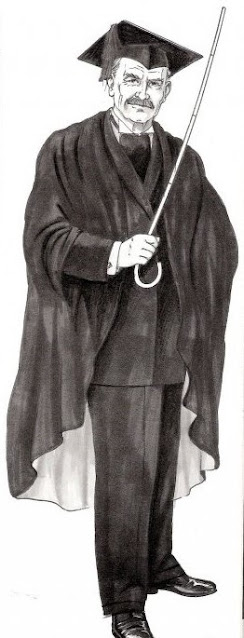Court tells boy who refused public caning ‘take it like a man’
A schoolboy who refused to be caned in front of the school after he and a friend were spotted smoking cigarettes in the street threw himself on the floor and “bellowed and roared,” a police court heard in 1929. The magistrates considered it would have been far better if he had taken his punishment like a man.
ASSAULT
SUMMONSES DISMISSED.
Schoolboys and masters to-day filled the Police Court at
Newport. Salop, for the hearing summonses against Mr. Walter Samuel Brooks,
M.A. (45), headmaster of Newport Grammar School, and two assistant masters,
Messrs. William Harmon and L. F. Lowe, alleging a common assault on Frank
Douglas Wright (16), son of Mr. Ernest J.
Wright, motor engineer, Chairman the Newport Urban Council.
The assault was alleged have been committed on
December 7th, after the boy had been seen smoking out of school hours. Mr.
Gilbert Griffiths, who appeared for the boy, submitted that the chastisement
was unreasonable under the circumstances. Wright had been a pupil at the school
for the past five years, and had borne an exemplary character. There had been
no complaint against him, and had never been thrashed of received any
punishment of a serious nature until this occurrence.
On December 6th the boy left after school hours in the
afternoon, and went to picture house, of which his father was the proprietor.
With him was another boy named Williams. It was with his father's knowledge
that young Wright occasionally smoked at home and in the street, and he did not
know that it was against the school regulation.
The operator at the picture house offered the two boys
cigarettes, and they walked along the street smoking. The next thing they heard
about the “enormous sin,” said Mr. Griffiths, was on the following morning.
After prayers the headmaster dismissed all the school below Form V.8., the
senior school of about 100 boys remaining behind. He then called Wright and
Williams before him, and told thein that it had been reported they were
seen-smoking in the street, and that he was going to make an example of them
and flog them.
FELT THE DISGRACE
Wright felt it was a disgrace to flog him before the
school and he dodged the headmaster who then told two assistant masters hold
him. The-boy rushed to the library stairs but was taken back by force and put
across a sloping desk and held there by the two assistant masters, while he was
flogged by Brooks with a cane in no gentle manner. The injuries on his legs and
buck were very severe. Williams was then thrashed.
Wright's father had an interview with the headmaster
and asked for a copy of the school rules. Brooks said that there was no printed
rule, but he understood it was known there was rule against smoking. Frank
Wright gave evidence that he had never been warned against smoking, had seen no
printed rules and did not know it was against the rules. Wright’s father stated
that had he known it was against the school rules he would not have allowed his
boy to smoke.
Brooks told him he had not warned the boy. Mr Haslam for
the defence said the point was not whether Brooks had authority to administer
the punishment but whether it was excessive. The punishment was not
unreasonable. Wright threw himself on the floor and “bellowed and roared”
STRUGGLING AND KICKING
Mr. W. S. Brooks, the headmaster, stated in evidence
that lie had addressed the boys on their proper conduct in the school and in
the streets and their general behaviour, including smoking. When told to
receive the caning. Wright said, “I refuse,” and was brought back struggling
and kicking wildly. He was given four strokes and then lay on the
floor-bellowing. Williams was caned and apologised. Wright was ordered to stand
and bend down, and he received the fifth and final stroke and apologised.
Cross-examined, Mr. Brooks said had caned five boys
out of 240. The punishment was given publicity to make it impressive and give
support to the prefects. He had never given a flogging with birch rod. William
Harman, assistant master, said that on the evening of the caning he saw Wright
in the street with girl. “He seemed to be having quite an enjoyable time.”
“PROPERLY CARRIED OUT.”
Mr. J. Clegg Hill, the Chairman of the Bench, said
that the headmaster was quite within his rights in administrating corporal punishment.
The boy Wright knew the rule of the school. The magistrates considered that the
caning was properly carried out. It would have been far better if Wright had
taken his punishment like a man.
All three summonses were dismissed and five guineas
costs were allowed the defendants, the Chairman saying: “We consider the case
ought never have been brought.”
As published in Gloucester
Citizen, 8 January 1929.
Picture credit: Unknown.
Traditional
School Discipline








Comments
Post a Comment